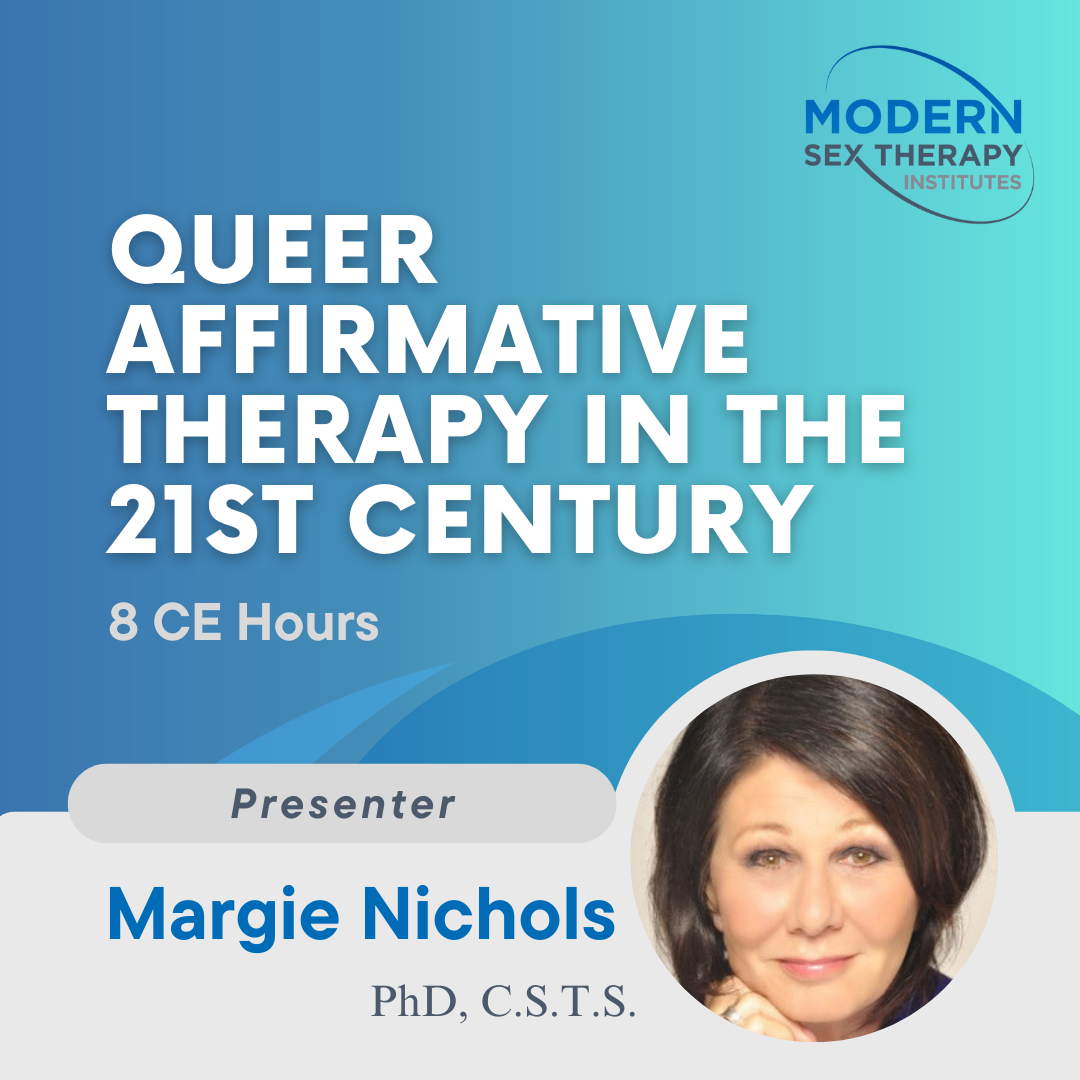FOR QUESTIONS & INTEREST: 561-379-7207
FOR CURRENT STUDENTS: (772)-209-9353
INFO@MODERNSEXTHERAPY.COM
- Certifications & Degrees
- Online Clinical Sexology PhD Program
- 2026 Calendar
- 2025 Calendar
- Sex Therapy Certification
- Transgender Affirmative Mental Health Care Certification
- Couples And Sex Therapy Certification
- LGBTQIA Affirmative Therapy Certification
- Sexual Trauma Certification
- Medical Sexology Certification
- Alternative Relationships Certification
- Sex Counselor Certification
- Certificate In Sexual Health
- Sex Educator Certification
- Problematic Sexual Behavior (PSB) Certification Program
- Somatic Sex Therapist Certification
- Neurodiversity Sexuality Professional Certification
- Sex Informed Therapist Certification
- Sexually Competent Therapist Certification
- Kink Conscious Professional Certification
- Sexual Trauma Informed Therapist Certification
- LGBTQIA+ Informed Professional Certification
- Neurodiverse Sexuality Aware Professional Certification
- Sexual Compulsivity Informed Professional Certification
- Certified Attachment Sex Therapist (CAST) Program
- Workshops & Webinars
- Calendar
- Registration & Fees
- Faculty
- Search
- Find a Professional
- Contact Us
Queer Affirmative Therapy in the 21st Century Presenter: Margaret Nichols, Ph.D. (8 CE Hours)
$320.00
8 CE Hours
Presented by: Margaret Nichols, Ph.D.
Recorded workshop available via video on demand
AASECT Category:
Human Sexuality Education
Section B
AND
Section D
Description:
Since homosexuality was removed from the DSM in 1973, there have been radical changes in the way the mental health field views sex and gender diverse people: those who are same-sex oriented, transgender people, those who identify as asexual, kinky, nonmonogamous, for example. At the same time, the ‘queer’ community has changed dramatically itself. What started as a movement of those who identified as gay or lesbian has become a ‘big tent’ community that includes all the groups mentioned above and others. In this workshop we will learn about the new paradigms that have replaced the old – diversity instead of pathology, gender spectrum instead of binary, sexual fluidity instead of fixed categories. We will examine the research on sex and gender diversity, including the body of research comparing same and opposite sex oriented couples. We will extract the lessons about sexuality and gender we can learn from studying diversity that apply to all clients, whether ‘mainstream’ or not.
Learning Objectives:
| • Describe the history of how psychiatry and sexology have viewed sex and gender variance from the 1860’s until the present |
| • Describe the rationale for the ‘pathology model’ and the rationale and evidence for the current ‘normality’ paradigm for sex and gender variance |
| • Explain how the ‘queer’ community has changed – and expanded – over the last forty years |
| • Define the concepts of intersectionality and the age cohort effect among LGBTQ people |
| • Describe the different subgroups within the queer community, especially: bisexuals; kinky people;nonmonogamous people |
| • List 3 in sights about ‘mainstream’ sexuality learned from the research on gay couples and on alternative sex and gender expressions |
| • Explain the new standards of care for transgender and gender nonconforming clients |
| • Describe some of the clinical issues that might come up with nonmonogamous or kinky clients, or couples where one member is bisexual, is transitioning, or wants to open the relationship |
Activity Timeline:
30 min- Introductions; Why It Matters To Know About Sex and Gender Diversity
1 hr – The History of Sexology and Psychiatry and Its Views of Sex and Gender Diverse People
15 min break
1 hr and 15 min – The Underpinnings of the Pathology Model; the Evidence for a Normative Model
1 hr How the Queer Community has Changed Since Stonewall
1 hr – Lunch
3o min – Processing the morning; Q & A
1 hr – Research on same sex couples and the implications for your practice
15 min – Break
1 hr – Bi, Trans, Kink and Nonmonogamy- implications for your practice
45 min – Small group role play
30 min – Summary and Discussion
Speaker Bio:
Margie is a queer-identified psychotherapist, writer, activist, and educator with forty years of experience working in the LGBT+ community. She is a licensed psychologist, AASECT certified sex therapy supervisor, and WPATH GEI (Global Education Initiative) Mentor. In 1983 Dr. Nichols founded the Institute for Personal Growth, a multi-site psychotherapy center in New Jersey that centers the LGBTQ+ community both as clients and therapists, and directed IPG until 2018. In 1985 she was a primary founder and the first Director of the Hyacinth AIDS Foundation, which continues to be New Jersey’s primary provider of social services and advocacy to people affected by HIV.
Dr. Nichols has authored more than two dozen papers or book chapters that are focused on LGBTQ+ issues. In 2020 her book, “The Modern Clinician’s Guide to Working with LGBTQ+ Clients” was published by Routledge Press.
Dr. Nichols also conducts trainings, workshops, and seminars virtually and in person. She supervises both therapists wishing to become AASECT-certified and those seeking WPATH certification, in addition to doing consults with therapists on specific cases.
She currently maintains a small private practice of therapy and consulting in Jersey City, New Jersey. She can be reached at drmargienichols@gmail.com.
Class originally recorded: 1/12/2019.
Social workers completing this course receive 8 general continuing education credits.
MSTI is an approved CE organizational provider for IBOSP, AASECT, and ASWB. Modern Sex Therapy Institutes is part of the Advanced Mental Health Training Institute. The Advanced Mental Health Training Institute has been approved by NBCC as an Approved Continuing Education Provider, ACEP No.6901. Programs that do not qualify for NBCC credit are clearly identified. The Advanced Mental Health Training Institute is solely responsible for all aspects of the programs.
MSTI is approved by the American Psychological Association to sponsor continuing education for Psychologists. The Modern Sex Therapy Institutes maintains responsibility for this program and its content.
Modern Sex Therapy Institutes (MSTI), provider #1787, is approved to offer social work continuing education by the Association of Social Work Boards (ASWB) Approved Continuing Education (ACE) program. Regulatory boards are the final authority on courses accepted for continuing education credit. ACE provider approval period: [1/7/22-1/7/26].
Attendees must attend the entire course and complete a course evaluation to be eligible for CE credit
For Live Courses: To obtain CE credits, attendees must attend the entire course and complete an evaluation to receive credit.
For asynchronous/recorded courses, Attendees must pass the multiple choice posttest with a minimum score of 80% in 3 attempts to be eligible for CE credit.
Certificates of completion can be downloaded immediately upon course completion.

